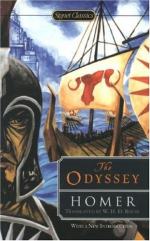’Ah, woe is me, child, for thy sake, all helpless that I am! Surely Zeus hated thee above all men, though thou hadst a god-fearing spirit! For never yet did any mortal burn so many fat pieces of the thigh and so many choice hecatombs to Zeus, whose joy is in the thunder, as thou didst give to him, praying that so thou mightest grow to a smooth old age and rear thy renowned son. But now from thee alone hath Zeus wholly cut off the day of thy returning. Haply at him too did the women mock in a strange land afar, whensoever he came to the famous palace of any lord, even as here these shameless ones all mock at thee. To shun their insults and many taunts it is that thou sufferest them not to wash thy feet, but the daughter of Icarius, wise Penelope, hath bidden me that am right willing to this task. Wherefore I will wash thy feet, both for Penelope’s sake and for thine own, for that my heart within me is moved and troubled. But come, mark the word that I shall speak. Many strangers travel-worn have ere now come hither, but I say that I have never seen any so like another, as thou art like Odysseus, in fashion in voice and in feet.’
Then Odysseus of many counsels answered her saying: ’Old wife, even so all men declare, that have beheld us twain, that we favour each other exceedingly, even as thou dost mark and say.’
Thereupon the crone took the shining cauldron, wherefrom {*} she set to wash his feet, and poured in much cold water and next mingled therewith the warm. Now Odysseus sat aloof from the hearth, and of a sudden he turned his face to the darkness, for anon he had a misgiving of heart lest when she handled him she might know the scar again, and all should be revealed. Now she drew near her lord to wash him, and straightway she knew the scar of the wound, that the boar had dealt him with his white tusk long ago, when Odysseus went to Parnassus to see Autolycus, and the sons of Autolycus, his mother’s noble father, who outdid all men in thievery and skill in swearing. This skill was the gift of the god himself, even Hermes, for that he burned to him the well-pleasing sacrifice of the thighs of lambs and kids; wherefore Hermes abetted him gladly. Now Autolycus once had gone to the rich land of Ithaca, and found his daughter’s son a child new-born, and when he was making an end of supper, behold, Eurycleia set the babe on his knees, and spake and hailed him: ’Autolycus find now a name thyself to give thy child’s own son; for lo, he is a child of many prayers.’
{* Reading [Greek]}
Then Autolycus made answer and spake: ’My daughter and my daughter’s lord, give ye him whatsoever name I tell you. Forasmuch as I am come hither in wrath against many a one, both man and woman, over the fruitful earth, wherefore let the child’s name be “a man of wrath,” Odysseus. But when the child reaches his full growth, and comes to the great house of his mother’s kin at Parnassus, whereby are my possessions, I will give him a gift out of these and send him on his way rejoicing.’




